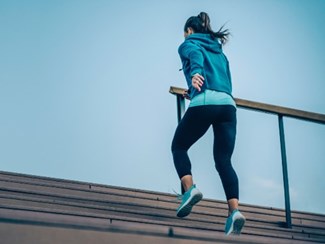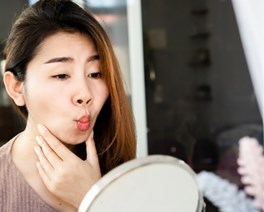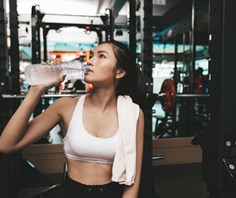Posted 2 December 2021
 We all know exercise is good for our bodies. But did you know that regular workouts can be anti-ageing too? Read on to explore the many benefits that keeping fit can have on our skin.
We all know exercise is good for our bodies. But did you know that regular workouts can be anti-ageing too? Read on to explore the many benefits that keeping fit can have on our skin.
Exercising often, whether it’s aerobic, strength, flexibility or balance training has been proven by scientists to reduce the chances of falling ill as well as delaying the signs of ageing. While no lotion or potion can increase longevity and make you look younger at the same time, regular effort and a little sweat can work wonders for your skin’s appearance.
Skin Tone Improvement
 Exercise can even out skin tone by flushing toxins and calming puffiness. After your liver, the skin is the biggest detoxifying agent in the body. Sweating removes toxins which not only makes you feel better, it rejuvenates your skin. However, be aware that there is some evidence that Bikram yoga and infra-red saunas may actually worsen pigmentation. (www.vogue.com.au)
Exercise can even out skin tone by flushing toxins and calming puffiness. After your liver, the skin is the biggest detoxifying agent in the body. Sweating removes toxins which not only makes you feel better, it rejuvenates your skin. However, be aware that there is some evidence that Bikram yoga and infra-red saunas may actually worsen pigmentation. (www.vogue.com.au)
Skin Glow Improvement
We have learnt that exercise promotes healthy circulation which helps clear your skin and keep it vibrant. When we push ourselves to the point of perspiration and looking red in the face – a result of increased blood flow to the dermis - our skin is being sent essential nutrients, hormones and increased oxygen. My clients who exercise regularly have more glow to their skin. Freshly exercised skin has an obvious rosy glow, however, it’s the day following exercise where we see the real benefits that oxygen-rich blood has on our skin.
Acne Improvement
You may have heard the old rumour that acne can be caused by sweat sitting on your skin. The science behind this disagrees: sweat is just a toxin secretion which doesn’t actually clog your pores. Exercise reduces inflammation which is one of the main causes of acne, plus it levels our stress hormone, cortisol, which can also trigger acne flare ups. So perhaps sweat, or the way we create sweat, has more benefits to our skin than we think.
Exercise has also shown to ease stress: a key trigger of acne and eczema. Although researchers are still investigating the link between stress and skin studies show that sebaceous glands, which produce oil in the skin, are influenced by stress hormones.
When we sweat our pores open and release the build-up inside of them. Sweat purges the body of toxins that would otherwise clog up pores and cause blemishes (healthy human life.com), making it helpful in clearing acne.
Skin Ageing Improvement
We all know our skin changes as the years advance, resulting in wrinkles, crow’s feet and sagging. After about 40, most of us begin to experience a thickening of our stratum corneum, the outer layer of epidermis, the top layer of the skin. This is the portion of the skin that you see and feel. Composed mostly of dead skin cells and some collagen, it gets drier, flakier and denser with age. At the same time the dermis, which sits below the epidermis, begins to thin. It loses cells and elasticity, giving the skin a more translucent and often saggier appearance (NYTimes.com)
Scientists have found that men and women who exercise frequently had markedly thinner, healthier strata cornea and thicker dermis layers to their skin. Of course, diet, genes and lifestyle also contribute to the outcomes.
Keeping the skin hydrated
 It is important to add the unbelievable difference drinking water has to the skin – especially when exercising. It is essential to hydrate before and after exercising, to keep the skin looking smooth and to get rid of the under-eye bags (which are a sure sign of dehydration). After all, our bodies are made up of 75% water so staying hydrated is extremely important.
It is important to add the unbelievable difference drinking water has to the skin – especially when exercising. It is essential to hydrate before and after exercising, to keep the skin looking smooth and to get rid of the under-eye bags (which are a sure sign of dehydration). After all, our bodies are made up of 75% water so staying hydrated is extremely important.
Article by Holly Mason of The Skin Investment Clinic with contributions from Personal Trainer, Belinda Andrews
www.theskininvestmentclinic.com
holly@theskininvestmentclinic.com
T: 07887855539
Posted in Men's Health, Womens health